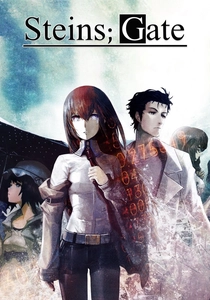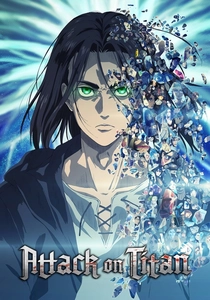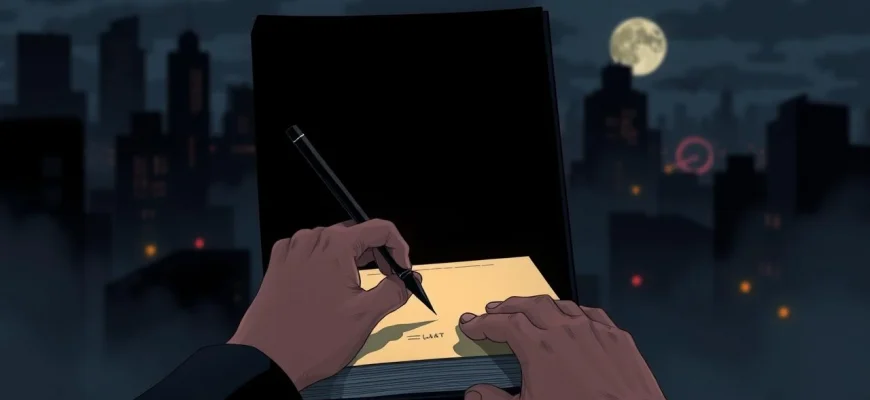If you're a fan of the psychological thriller 'Death Note' (2006), you're likely drawn to its intense cat-and-mouse game, moral dilemmas, and supernatural elements. This article explores 10 movies and TV shows that capture the same dark, intellectual, and suspenseful vibe, perfect for fans craving more mind-bending narratives. Whether you love the strategic battles, the supernatural twists, or the deep philosophical questions, these recommendations will keep you on the edge of your seat.

Ghost in the Shell: Stand Alone Complex (2002)
Description: Ghost in the Shell: Stand Alone Complex shares DEATH NOTE's exploration of justice, identity, and the ethical use of power. Both series feature protagonists who operate outside conventional law enforcement to achieve their goals. The philosophical depth and cyberpunk setting of Ghost in the Shell provide a different but equally thought-provoking experience.
Fact: The series is based on the manga by Masamune Shirow. It explores themes of artificial intelligence and human consciousness. The Laughing Man arc is particularly notable for its complex narrative, similar to DEATH NOTE's cat-and-mouse games.
 Watch Now
Watch Now 
Paranoia Agent (2004)
Description: Paranoia Agent, like DEATH NOTE, explores psychological and societal themes, with a focus on how individuals cope with stress and guilt. The series' surreal and dark tone mirrors DEATH NOTE's atmosphere, and both feature complex narratives that challenge viewers' perceptions of reality and justice.
Fact: The series was created by Satoshi Kon, a renowned director known for Perfect Blue and Paprika. Paranoia Agent was Kon's only television series, as he primarily worked on films. The show's opening theme, 'Yume no Shima Shinen Kouen,' is performed by Susumu Hirasawa, who also composed music for Berserk.
 Watch Now
Watch Now 
Code Geass: Lelouch of the Rebellion (2006)
Description: Similar to DEATH NOTE (2006), Code Geass features a highly intelligent protagonist, Lelouch, who gains a supernatural power (Geass) that allows him to manipulate others, much like Light Yagami with the Death Note. Both series explore themes of justice, power, and morality, with complex psychological battles and strategic mind games. The cat-and-mouse dynamic between Lelouch and his adversaries mirrors that of Light and L.
Fact: The series was directed by Gorō Taniguchi, who also worked on Planetes and Infinite Ryvius. The character designs were done by CLAMP, a famous manga artist group known for works like Cardcaptor Sakura. The series has been praised for its intricate plot and political intrigue, similar to DEATH NOTE.
 Watch Now
Watch Now 
Black Butler (2008)
Description: Black Butler, like DEATH NOTE, features a protagonist, Ciel Phantomhive, who forms a pact with a supernatural being (Sebastian) to achieve his goals. Both series blend dark themes with strategic thinking and moral ambiguity. The gothic aesthetic and tone of Black Butler also parallel DEATH NOTE's darker moments.
Fact: The series is set in Victorian England and combines historical elements with supernatural fiction. Black Butler has a strong fanbase for its stylish animation and complex characters. The relationship between Ciel and Sebastian is central to the story, much like Light and Ryuk.
 Watch Now
Watch Now 
Steins;Gate (2011)
Description: Steins;Gate shares DEATH NOTE's focus on a brilliant protagonist, Okabe Rintarou, who becomes entangled in a high-stakes game of wits and consequences. Both series explore themes of power, responsibility, and the moral implications of altering reality. The intense, suspenseful storytelling is a hallmark of both shows.
Fact: Steins;Gate is based on a visual novel by 5pb. and Nitroplus. The series is known for its intricate plot and time travel mechanics. The protagonist's eccentric personality and genius intellect are reminiscent of Light Yagami.
 Watch Now
Watch Now 
Psycho-Pass (2012)
Description: Psycho-Pass shares DEATH NOTE's dark and psychological themes, focusing on justice and the morality of using power to judge others. The Sibyl System, which determines people's criminal tendencies, parallels the Death Note's role as a tool for judgment. Both series question the ethics of absolute justice and feature intense intellectual battles between the protagonist and antagonist.
Fact: Psycho-Pass was written by Gen Urobuchi, known for his work on Madoka Magica and Fate/Zero. The series explores dystopian themes, much like DEATH NOTE, but in a futuristic setting. The protagonist, Akane Tsunemori, undergoes significant character development, similar to Light Yagami's transformation.
 Watch Now
Watch Now 
Attack on Titan (2013)
Description: Attack on Titan, like DEATH NOTE, features a protagonist, Eren Yeager, who seeks to eradicate a perceived evil (Titans in Attack on Titan, criminals in DEATH NOTE). Both series explore themes of vengeance, justice, and the moral ambiguity of using extreme measures to achieve one's goals. The high-stakes, suspenseful storytelling is a common thread.
Fact: The series is based on a manga by Hajime Isayama. Attack on Titan has been praised for its world-building and character development. The series' intense action and psychological depth have drawn comparisons to DEATH NOTE.
 Watch Now
Watch Now 
Tokyo Ghoul (2014)
Description: Tokyo Ghoul shares DEATH NOTE's dark and psychological themes, with a protagonist, Kaneki Ken, who undergoes a dramatic transformation after gaining supernatural abilities. Both series explore the moral complexities of power and the struggle between humanity and monstrosity.
Fact: The series is based on a manga by Sui Ishida. Tokyo Ghoul's intense and violent themes are similar to DEATH NOTE's darker moments. The protagonist's internal conflict and evolution are key aspects of the story.
 Watch Now
Watch Now 
Death Parade (2015)
Description: Death Parade, like DEATH NOTE, deals with themes of life, death, and judgment. Both series feature supernatural arbiters (Ryuk in DEATH NOTE, Decim in Death Parade) who observe and influence human actions. The psychological and moral dilemmas faced by the characters are central to both stories.
Fact: The series was produced by Madhouse, the same studio behind DEATH NOTE. Death Parade originated from a short film called Death Billiards. The series' unique premise and emotional depth have drawn comparisons to DEATH NOTE.
 Watch Now
Watch Now 
The Promised Neverland (2019)
Description: The Promised Neverland, like DEATH NOTE, revolves around a group of highly intelligent children who must outsmart their adversaries using their wits. The series features intense psychological battles and strategic planning, reminiscent of Light and L's confrontations. Both stories delve into themes of survival, morality, and the cost of freedom.
Fact: The series is based on a manga written by Kaiu Shirai and illustrated by Posuka Demizu. The first season was directed by Mamoru Kanbe, who also worked on Elfen Lied. The Promised Neverland has been compared to DEATH NOTE for its suspenseful and cerebral storytelling.
 Watch Now
Watch Now 








